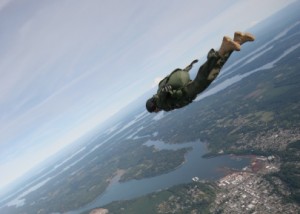By Kara Jorvig
How do you respond when an unexpected challenge hits your business? What do you do when you can’t make a solid plan because there are so many unknowns?
When the economy is good, your supply chain is solid and the customer trends are favorable, your organization is likely to experience success. Your leaders feel comfortable and confident in their abilities to set a plan, provide direction and move the business forward.
It’s when challenges arise that true leadership — or the lack thereof — becomes glaringly obvious. In times of stress or unexpected change, you need leaders to deliver clarity, think strategically and act wisely. When leaders don’t know how to respond, chaos ensues.
That’s why leadership development is so critical. And yet, it is an area many companies fail to address.
More than a quarter of managers said they weren’t ready to become a leader when they started managing others, and 58% said they didn’t receive any training at all, according to one CareerBuilder survey. Likewise, in Deloitte’s 2019 Global Human Capital Trends report, 41% of business leaders said they believe their organizations fail to meet needed leadership standards.
WHAT CAUSES THE LEADERSHIP GAP?
If we know leadership skills are important, why is this disconnect so high? There are two key issues.
The first is that developing leadership skills is challenging. In business, we have a tendency to focus on developing our technical skills, subject matter expertise and industry knowledge. As a result, we often ignore intentionally developing our leadership competencies to scale our organizations effectively. When this happens, the organization outgrows the capabilities and capacity of its leaders.
The second factor is the broader shift in many organizations from a traditional command-and-control business environment to a more collaborative, high-performance team environment.
In a traditional environment, decision-making is centralized among a few top leaders. It is a model that worked in business for generations. But today’s high performers are motivated by a different environment, one that emphasizes collaboration and diversity and offers them a feeling of value, purpose and impact.
Recognizing this, many top-down organizations are seeking to expand their leadership base by adopting a high-performance team model. However, it’s not an easy shift. Change can be difficult for the existing leaders, and the new leaders often have no experience being included at the table where decisions are made.
HOW DO WE TRAIN LEADERS?
When we study high-performance teams in sports or the military, one of the consistent attributes is the discipline of training. These teams have practiced every play, every possible scenario, and perfected their response. As a result, they can confidently move as a cohesive unit through any challenge.
This kind of training is virtually nonexistent in business. We’re often operating without a guidebook as business leaders and entrepreneurs. We face situations daily that we’ve never seen before, and we don’t always have the templates, experience and training to prepare us for facing adversity, growth, change and the unknown.
It’s one of the reasons we’ve introduced experiential learning concepts into our leadership development programs at Allegro Group. Managing Director of Leadership Development Phil Kornachuk is a retired U.S. Army Lieutenant Colonel who spent 22 years serving in some of the world’s most elite special operations units. He is a master at creating real-time scenarios that test, challenge and activate people’s leadership skills and competencies in surprising ways.
In the military, you cannot advance up the leadership ranks without completing the required training to prepare you for the next level. You must be exposed to specific scenarios designed to prepare you for the challenges ahead.

At Allegro Group, we’ve adapted this scenario-based training for business scenarios.
It is virtually impossible to train and rehearse for the biggest challenges we face in business. How, for example, can you train a leadership team to deal with losing a major client or the disruptions that come from something as shocking as a global pandemic? That’s not something you want to test out just for the sake of practice.
What you can do, however, is practice dealing with the unknown. You train for chaos. You can intentionally place yourself in situations that allow you to condition yourself to navigate uncertainty and change. You won’t be experiencing the exact challenges you’ll see in business, but you will be building muscles and gaining confidence in your ability to lead through adversity.
This isn’t a military boot camp or a high-impact sports training program — far from it. Instead, we take teams outside the boardroom and present them with scenarios that, at first glance, feel unlike anything they would ever experience in their day-to-day business roles. This approach levels the playing field, creating an environment where everyone is stripped of their usual competence. They then must respond based on their core leadership skills.

The power of these scenarios comes in the debriefing sessions that follow, where we get to the core of high-performance leadership. The scenarios create opportunities for enhanced self-awareness. Participants are quickly able to identify areas where they have strengths and where they have opportunities to improve. It is inspiring to see how a change in perspective can unlock new insights into people’s understanding of their capabilities and areas for opportunity.
WHY DOES THIS TRAINING WORK?
The human brain holds two things: Information we put into it and information that someone else does. During times of chaos or adversity, we each respond by drawing from these inputs. By intentionally practicing in strategically crafted situations, leaders can gain valuable experience they can draw from in the future. These exercises are more than leadership tests; they are a rehearsal space where executives can gain experience handling adversity.
Adversity isn’t going away. But with training, you and your team can get better at handling it.
Kara Jorvig is the founder and CEO of Allegro Group, a premier consulting, organizational development and talent acquisition firm. For nearly 20 years, she has partnered with CEOs and executive teams to help them assemble, activate and accelerate their A-Teams. For more from Kara, follow her on Instagram @kara.jorvig or LinkedIn @KaraJorvig and visit karajorvig.com.

